Provide an environment that encourages learning
Did you know?
Children need to feel safe and comfortable to be able to learn new skills and develop independence.
Although we are encouraging children to learn the skills to help themselves and become independent, it is important to remember that children should not just be left to their own devices.
You need to monitor and observe the children as they develop, allowing you to set goals that meet their needs, use strategies to help them achieve the goals and keep track of their progress.
Physical environment
Think about your surroundings? What do you notice?
Do they make you feel happy? Cared for and capable? Or unimportant and unhappy?
A child's need to develop independence can be supported by a physical environment that encourages their self-help skills and provides them with the opportunity to make choices about what they will do. As they become more independent, children will start to take greater responsibility for caring for themselves during routines such as feeding, dressing and toileting. Caregivers can provide support for the gradual development of these skills through both their interactions and setting up of the physical environment.
The surroundings or environment at a child care facility send a message to the children about whether they are important and cared for. As a caregiver, you can't be sure that the environment will have a positive impact on the child's self esteem unless you plan it that way. You should consider both the inside and outside environments.
There's a number of things you can do to help create a positive physical environment and promote independence. To find out more, work through the resource sheet below.
Creating a positive physical environment
Creating a climate of encouragement
Encourage children to test their boundaries, don't be too eager to 'jump in' and do the task yourself, encourage new and challenging tasks and support every attempt. Remember, it is the process, not the end product, that you are building!
All efforts should be encouraged - acknowledge children's achievements. Take time to get down to their level and give individual encouragement, and ask questions and acknowledge what a great job they have done.
Remember to point out a child's achievement to all the children in the group. Praising the individual child encourages others to 'have a go' themselves. When you say something like; “Look, everyone - John has finished his jigsaw. Isn't that good?”, the public recognition boosts the self esteem of the individual and encourages others to seek approval by joining in.
A climate of encouragement
Here are some examples of ways to communicate with children to encourage them. Click each item for more information.
- Recognise effort
- Show confidence
- Demonstrate acceptance
- Appreciate contributions
- Encourage appreciation from others
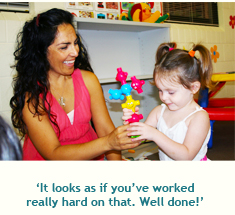
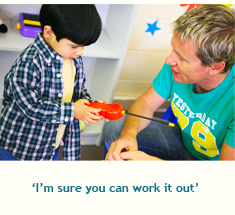
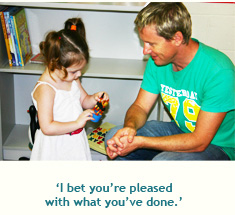
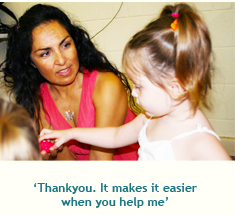
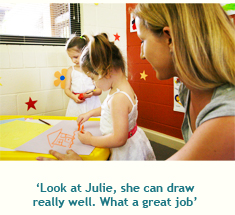
In your notebook, write down another encouraging comment you could make for each picture.
Ryan is the Child Care Assistant in the 2 - 3 years room. The children in his care have recently got a guinea pig that they are caring for. The children are very inquisitive and are continually asking Ryan questions about how to feed the guinea pig, how to pick him up, and what he can do.
How should Ryan respond to their questions? (Click on your choice from the options below)
No, Ryan should not tell the children to stop asking questions. Ryan should be there to support the children as they explore their capabilities. The inquisitive nature of young children should be fostered and they should feel that it is okay to ask questions and ask for help when needed. Try again.
Well done! Yes, it is important that Ryan encourages the children to ask questions and lets them know that he is there for them if they want to ask a question or ask for help. Trust is a key issue when children are gaining independence. A safe environment is needed to allow children to explore their capabilities and give them to confidence to ask for help as they develop. The children will also gain a sense of willingness to assist others in their development, as they follow Ryan's role modelling.
No, a caregiver shouldn't play favourites with the children by only answering some children's questions. All children need support as they develop and Ryan should be creating a safe environment for all of the children to feel confident in asking questions or for help. A good way of answering children's questions is by sharing your own experiences, so Ryan should use his own stories and experiences to help him talk about tasks that the children are learning and why they are important. Try again.




